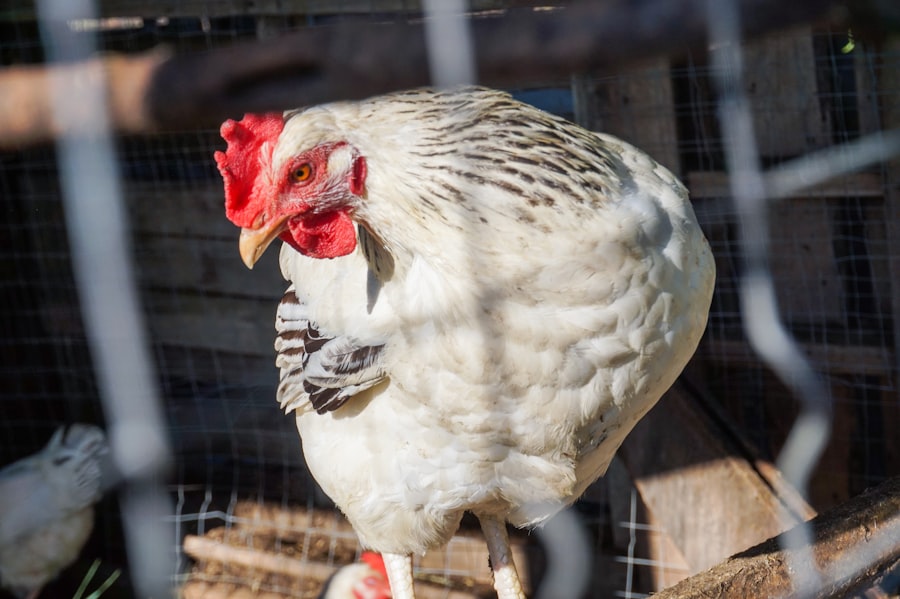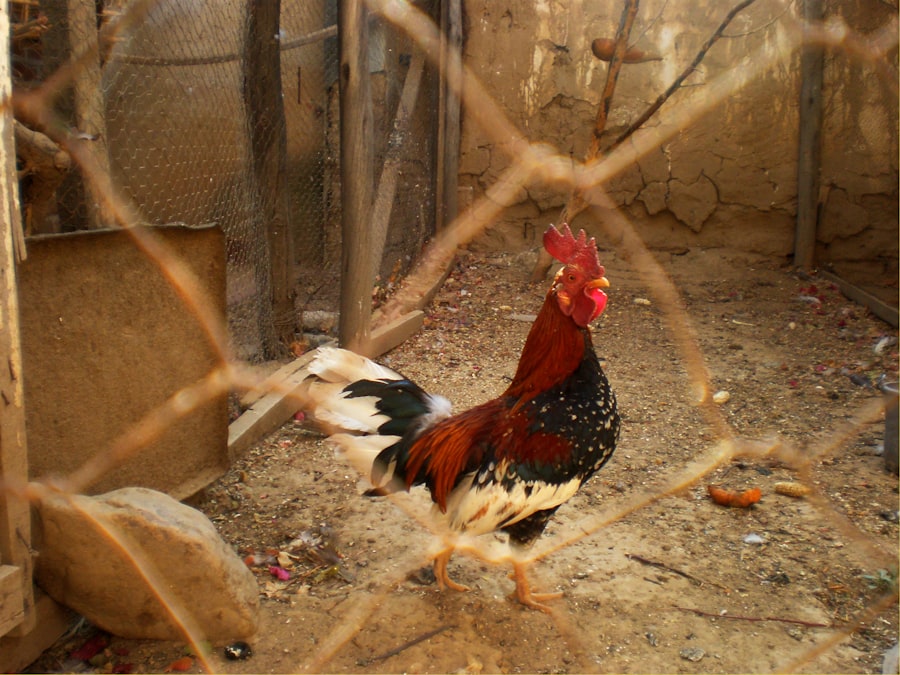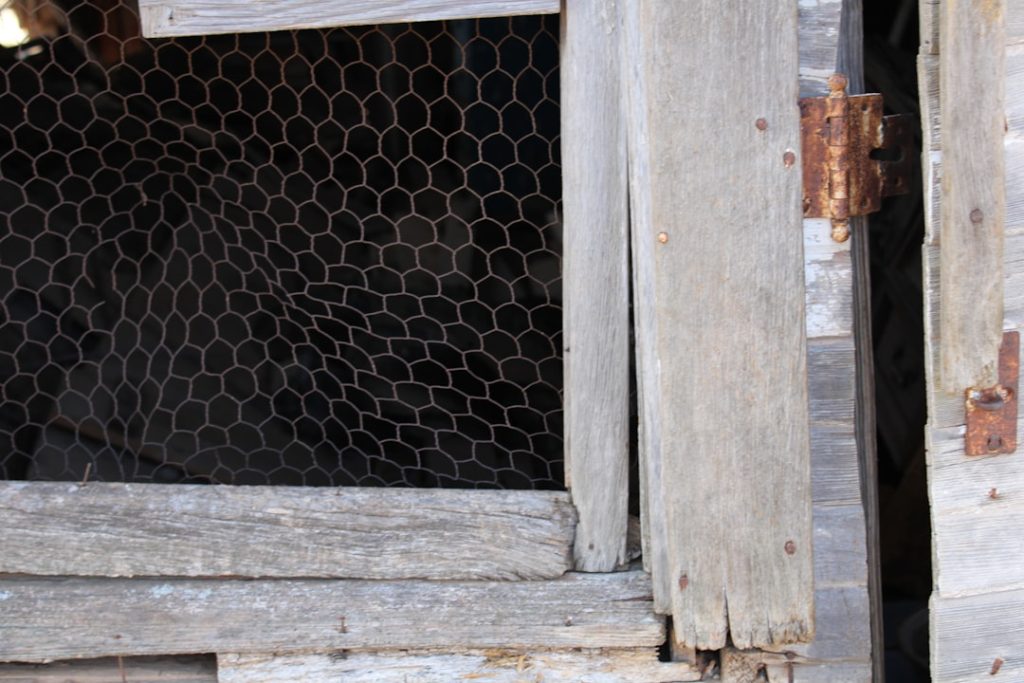Chickens are naturally curious and social animals that exhibit exploratory behavior in search of food and new environments. Their persistence and determination in finding food sources can lead them to enter areas where they are not desired. Understanding chicken behavior is essential for effectively deterring them from unwanted spaces.
By recognizing their natural instincts and tendencies, it becomes possible to implement effective strategies to discourage their presence in certain areas. Chickens are attracted to locations that provide food, water, and shelter. They also seek out safe roosting spots.
This knowledge suggests that effective deterrent methods include creating physical barriers, using repellents, and offering alternative roosting areas. Noise and motion devices can be employed to disrupt the chickens’ sense of security, making specific locations less appealing. Consistently removing food sources is crucial in deterring chickens, as it eliminates a primary attraction.
By addressing these basic needs and understanding chicken behavior, it is possible to effectively prevent chickens from accessing unwanted areas.
Table of Contents
- 1 Creating a Barrier to Prevent Access
- 2 Using Repellents to Deter Chickens
- 3 Providing Alternative Roosting Spots
- 4 Implementing Noise and Motion Devices
- 5 Consistently Removing Food Sources
- 6 Seeking Professional Help if Necessary
- 7 FAQs
- 7.1 What are some effective ways to keep chickens off my deck?
- 7.2 Why is it important to keep chickens off my deck?
- 7.3 Are there any natural deterrents to keep chickens away from my deck?
- 7.4 Can I train my chickens to stay off my deck?
- 7.5 What are some potential risks of having chickens on my deck?
Key Takeaways
- Chickens are naturally curious and will explore their surroundings, including areas they are not supposed to be in.
- Creating physical barriers such as fences or netting can effectively prevent chickens from accessing certain areas.
- Repellents such as citrus peels or predator urine can be used to deter chickens from specific areas.
- Providing alternative roosting spots such as designated perches or shelters can redirect chickens away from unwanted areas.
- Noise and motion devices such as scarecrows or ultrasonic repellents can startle and discourage chickens from entering restricted areas.
- Consistently removing food sources such as spilled grains or uncovered garbage can help discourage chickens from lingering in unwanted areas.
- If the chicken infestation is persistent or severe, it may be necessary to seek professional help from pest control experts or animal control services.
Creating a Barrier to Prevent Access
Underground Barriers
Additionally, burying the barrier underground can prevent chickens from digging underneath it. It is important to regularly inspect the barrier for any signs of damage or weakness and promptly repair any issues to maintain its effectiveness.
Visual Deterrents
Another method of creating a barrier is by using visual deterrents such as scarecrows or reflective objects that move in the wind. These visual deterrents can make chickens feel uneasy and discourage them from approaching the protected area. It is important to regularly move these visual deterrents around to prevent chickens from becoming accustomed to their presence.
Effectiveness and Maintenance
Creating a barrier to prevent access is an effective way to deter chickens from unwanted areas and protect valuable crops or property. Regular inspection and maintenance of the barrier are crucial to ensure its effectiveness in keeping chickens out.
Using Repellents to Deter Chickens

Using repellents is another effective method for deterring chickens from accessing unwanted areas. There are various types of repellents available, including chemical sprays, natural oils, and ultrasonic devices. Chemical sprays can be applied to surfaces or plants that chickens are attracted to, creating an unpleasant scent or taste that deters them from approaching.
Natural oils such as peppermint or citrus can also be used as repellents, as chickens find these scents unpleasant and will avoid areas where they are present. Ultrasonic devices emit high-frequency sounds that are uncomfortable for chickens, causing them to stay away from the protected area. It is important to regularly reapply repellents as needed, especially after rainfall or when the scent begins to fade.
Additionally, using a combination of different types of repellents can increase their effectiveness in deterring chickens. When using chemical sprays, it is important to choose products that are safe for the environment and other animals that may frequent the area. Using repellents is an effective way to discourage chickens from accessing unwanted spaces without causing them harm.
Using repellents is another effective method for deterring chickens from accessing unwanted areas. There are various types of repellents available, including chemical sprays, natural oils, and ultrasonic devices. Chemical sprays can be applied to surfaces or plants that chickens are attracted to, creating an unpleasant scent or taste that deters them from approaching.
Natural oils such as peppermint or citrus can also be used as repellents, as chickens find these scents unpleasant and will avoid areas where they are present. Ultrasonic devices emit high-frequency sounds that are uncomfortable for chickens, causing them to stay away from the protected area. It is important to regularly reapply repellents as needed, especially after rainfall or when the scent begins to fade.
Additionally, using a combination of different types of repellents can increase their effectiveness in deterring chickens. When using chemical sprays, it is important to choose products that are safe for the environment and other animals that may frequent the area. Using repellents is an effective way to discourage chickens from accessing unwanted spaces without causing them harm.
Providing Alternative Roosting Spots
Chickens are naturally drawn to areas where they can roost and feel safe. By providing alternative roosting spots away from unwanted areas, it is possible to deter them from accessing specific locations. This can be achieved by installing roosting poles or structures in designated areas where chickens are welcome.
These alternative roosting spots should be placed in open areas away from valuable crops or property, encouraging chickens to roost there instead of in unwanted spaces. Additionally, providing nesting boxes in designated areas can also encourage chickens to stay away from unwanted locations. By offering comfortable and secure nesting spots, chickens will be less likely to seek out alternative nesting sites in unwanted areas.
It is important to regularly clean and maintain these alternative roosting spots to ensure that they remain attractive to chickens. Providing alternative roosting spots is an effective way to redirect chickens away from unwanted areas while still meeting their natural instincts and needs. Chickens are naturally drawn to areas where they can roost and feel safe.
By providing alternative roosting spots away from unwanted areas, it is possible to deter them from accessing specific locations. This can be achieved by installing roosting poles or structures in designated areas where chickens are welcome. These alternative roosting spots should be placed in open areas away from valuable crops or property, encouraging chickens to roost there instead of in unwanted spaces.
Additionally, providing nesting boxes in designated areas can also encourage chickens to stay away from unwanted locations. By offering comfortable and secure nesting spots, chickens will be less likely to seek out alternative nesting sites in unwanted areas. It is important to regularly clean and maintain these alternative roosting spots to ensure that they remain attractive to chickens.
Providing alternative roosting spots is an effective way to redirect chickens away from unwanted areas while still meeting their natural instincts and needs.
Implementing Noise and Motion Devices
Implementing noise and motion devices is an effective way to deter chickens from accessing unwanted areas. These devices disrupt the sense of security that chickens rely on and make them uncomfortable, encouraging them to stay away. Noise devices such as air horns or ultrasonic alarms emit loud sounds that startle chickens and discourage them from lingering in specific locations.
Motion devices such as sprinklers or spinning objects create unexpected movements that make chickens feel uneasy and prompt them to leave the area. It is important to regularly move these noise and motion devices around to prevent chickens from becoming accustomed to their presence. Additionally, using a combination of different devices can increase their effectiveness in deterring chickens.
When implementing noise devices, it is important to consider the impact on other animals or people in the vicinity and choose products that are safe for the environment. Implementing noise and motion devices is an effective way to disrupt the sense of security that chickens rely on and discourage them from accessing unwanted spaces. Implementing noise and motion devices is an effective way to deter chickens from accessing unwanted areas.
These devices disrupt the sense of security that chickens rely on and make them uncomfortable, encouraging them to stay away. Noise devices such as air horns or ultrasonic alarms emit loud sounds that startle chickens and discourage them from lingering in specific locations. Motion devices such as sprinklers or spinning objects create unexpected movements that make chickens feel uneasy and prompt them to leave the area.
It is important to regularly move these noise and motion devices around to prevent chickens from becoming accustomed to their presence. Additionally, using a combination of different devices can increase their effectiveness in deterring chickens. When implementing noise devices, it is important to consider the impact on other animals or people in the vicinity and choose products that are safe for the environment.
Implementing noise and motion devices is an effective way to disrupt the sense of security that chickens rely on and discourage them from accessing unwanted spaces.
Consistently Removing Food Sources

Eliminate the Incentive
Chickens are naturally drawn to places where they can find food, so eliminating this incentive will discourage them from lingering in specific locations. This can be achieved by regularly cleaning up spilled feed or food scraps and securing garbage cans with tight-fitting lids.
Additional Measures
It is also important to remove fallen fruits or vegetables from the ground and keep compost piles covered. Additionally, planting cover crops or ground covers can help reduce available food sources for chickens by limiting their access to bare soil where insects and seeds may be present.
The Benefits of a Clean Environment
By consistently removing food sources, it becomes less appealing for chickens to access specific areas, ultimately deterring them from lingering there. This approach not only discourages chickens but also helps maintain a clean and organized environment.
Seeking Professional Help if Necessary
If all else fails, seeking professional help may be necessary when dealing with persistent chicken-related issues. Professional pest control services or animal control agencies have the expertise and resources needed to effectively address chicken infestations while ensuring humane treatment of the animals involved. These professionals can assess the situation, implement appropriate measures for deterrence or removal, and provide guidance on preventing future occurrences.
In some cases, legal regulations may apply when dealing with nuisance animals such as chickens, so seeking professional help ensures compliance with local laws and regulations while addressing the issue effectively. Professional help may also be necessary when dealing with large-scale chicken infestations that require specialized equipment or techniques for removal. By seeking professional assistance when necessary, it becomes possible to address chicken-related issues effectively while ensuring ethical treatment of the animals involved.
If all else fails, seeking professional help may be necessary when dealing with persistent chicken-related issues. Professional pest control services or animal control agencies have the expertise and resources needed to effectively address chicken infestations while ensuring humane treatment of the animals involved. These professionals can assess the situation, implement appropriate measures for deterrence or removal, and provide guidance on preventing future occurrences.
In some cases, legal regulations may apply when dealing with nuisance animals such as chickens, so seeking professional help ensures compliance with local laws and regulations while addressing the issue effectively. Professional help may also be necessary when dealing with large-scale chicken infestations that require specialized equipment or techniques for removal. By seeking professional assistance when necessary, it becomes possible to address chicken-related issues effectively while ensuring ethical treatment of the animals involved.
In conclusion, understanding the behavior of chickens is crucial in effectively deterring them from accessing unwanted areas. Creating barriers, using repellents, providing alternative roosting spots, implementing noise and motion devices, consistently removing food sources, and seeking professional help if necessary are all effective strategies for addressing chicken-related issues while ensuring ethical treatment of the animals involved. By implementing these strategies in a comprehensive manner, it becomes possible to deter chickens effectively while maintaining a clean and organized environment.
If you’re looking for more tips on keeping chickens, you might be interested in this article on chicken coop run plans. It provides helpful information on how to create a safe and secure outdoor space for your chickens to roam, which could also help keep them off your deck.
FAQs
What are some effective ways to keep chickens off my deck?
Some effective ways to keep chickens off your deck include installing physical barriers such as fences or netting, using repellents such as citrus peels or vinegar, and training your chickens to stay away from the deck.
Why is it important to keep chickens off my deck?
Keeping chickens off your deck is important to maintain a clean and sanitary outdoor living space, prevent damage to the deck from scratching and pecking, and to avoid potential health hazards from chicken droppings.
Are there any natural deterrents to keep chickens away from my deck?
Yes, there are natural deterrents such as planting prickly or thorny plants around the deck, using strong-smelling herbs like lavender or mint, and sprinkling cayenne pepper or coffee grounds in the area.
Can I train my chickens to stay off my deck?
Yes, you can train your chickens to stay off your deck by using positive reinforcement, such as offering treats when they stay away from the deck, and by consistently redirecting them to other areas of the yard.
What are some potential risks of having chickens on my deck?
Having chickens on your deck can pose risks such as damage to the deck surface, accumulation of droppings leading to unsanitary conditions, and potential conflicts with other pets or family members using the deck.
Meet Walter, the feathered-friend fanatic of Florida! Nestled in the sunshine state, Walter struts through life with his feathered companions, clucking his way to happiness. With a coop that’s fancier than a five-star hotel, he’s the Don Juan of the chicken world. When he’s not teaching his hens to do the cha-cha, you’ll find him in a heated debate with his prized rooster, Sir Clucks-a-Lot. Walter’s poultry passion is no yolk; he’s the sunny-side-up guy you never knew you needed in your flock of friends!







